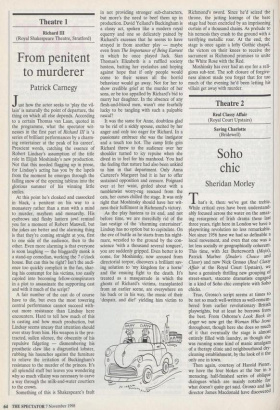Theatre 1
Richard HI (Royal Shakespeare Theatre, Stratford)
From penitent to murderer
Patrick Carnegy
Just how the actor seeks to 'play the vil- lain' is naturally the point of departure, the thing on which all else depends. According to a certain Thomas van Laan, quoted in the programme, what the spectator wit- nesses in the first part of Richard III is 'a series of brilliant performances by a charm- ing entertainer at the peak of his career'. Prescient words, catching the essence of Robert Lindsay's assumption of the title role in Elijah Moshinsky's new production. Not that this needed flagging up in prose, for Lindsay's acting has you by the lapels from the moment he emerges through the falling snow of the opening tableau into the glorious summer of his winning little smiles.
At this point he's cloaked and cassocked in black, a penitent on his way to a monastery rather than a man with a mind to murder, mayhem and monarchy. His eyebrows and fleshy lantern jowl remind you for a moment of Robert Maxwell, but the jokes are better and the alarming thing is that they're coming straight at you, first to one side of the audience, then to the other. Even more alarming is that everyone is soon laughing — the blaggardly monk is a stand-up comedian, working the 7 o'clock house. But can this be right? Isn't the audi- ence too quickly complicit in the fun, shar- ing his contempt for his victims, too easily cajoled into becoming fellow-conspirators in a plot to assassinate the supporting cast and with it much of the script?
A fair number of the cast do of course have to die, but even the most towering central performance cannot succeed with- out more resistance than Lindsay here encounters. Hard to tell how much of this is casting and how much production, but Lindsay seems uneasy that attention should ever stray from him. His weapon is the pro- tracted, sullen silence, the obscenity of his repulsive fidgeting — dismembering his prosthetic claw like a disgruntled lobster, rubbing his haunches against the furniture to relieve the irritation of Buckingham's resistance to the murder of the princes. It's all splendid stuff but leaves you wondering why so much villainy was necessary to carve a way through the milk-and-water courtiers to the crown.
Something of this is Shakespeare's fault in not providing stronger sub-characters, but more's the need to beef them up in production. David Yelland's Buckingham is a classy act, spoken like a modern royal equerry and one so delicately pained by Richard's excesses that he seems to have strayed in from another play — maybe even from The Importance of Being Earnest in which he once played Jack. Sian Thomas's Elizabeth is a ruffled society hostess, batting her eyelashes and hoping against hope that if only people would come to their senses all the horrid behaviour would go away. Not for her to show credible grief at the murder of her sons, or be too appalled by Richard's bid to marry her daughter. In the absence of any flesh-and-blood men, wasn't one fearfully lucky to be tangling with such a palpable rascal?
It was the same for Anne, doubtless glad to be rid of a sickly spouse, excited by her anger and only too eager for Richard. In a passionate embrace she was the instigator and a touch too hot. The camp little gin Richard threw to the audience over her shoulder turned to icy repulse when she dived in to feel for his manhood. You had the feeling that nature had also been unkind to him in that department. Only Anna Carteret's Margaret had it in her to offer sustained opposition and censure. Poignard ever at her waist, girded about with a tumbletwist worry-rug rescued from the cats, her curses chilled the stage. It was only right that Moshinslcy should have her wit- ness their fulfilment in Richmond's victory.
As the play hastens to its end, and not before time, we are mercifully rid of the last vestige of the 'charming entertainer'. Lindsay has no option but to capitulate. On the eve of battle as he starts from his night- mare, wrestled to the ground by the con- science 'with a thousand several tongues', you are suddenly gripped. Even better is to come, for Moshinsky, now aroused from directorial torpor, discovers a brilliant sav- ing solution to 'my kingdom for a horse' and the ensuing fight to the death. It's treated as a masquerade in which the ghosts of Richard's victims, transplanted from an earlier scene, are everywhere on his back or in his way, the music of their 'despair, and die!' yielding him victim to Richmond's sword. Since he'd seized the throne, the jutting lozenge of the bare stage had been encircled by an imprisoning curtain of a thousand chains. As prelude to his nemesis they crash to the ground with a terrifying metallic roar. At the end, the stage is once again a lofty Gothic chapel, the victors on their knees to receive the sacrament as Richmond promises to unite the White Rose with the Red.
MoshinsIcy has ever had an eye for a reli- gious sub-text. The soft closure of forgive- ness almost made you forget that for too much of the evening he'd been letting his villain get away with murder.


















































































 Previous page
Previous page